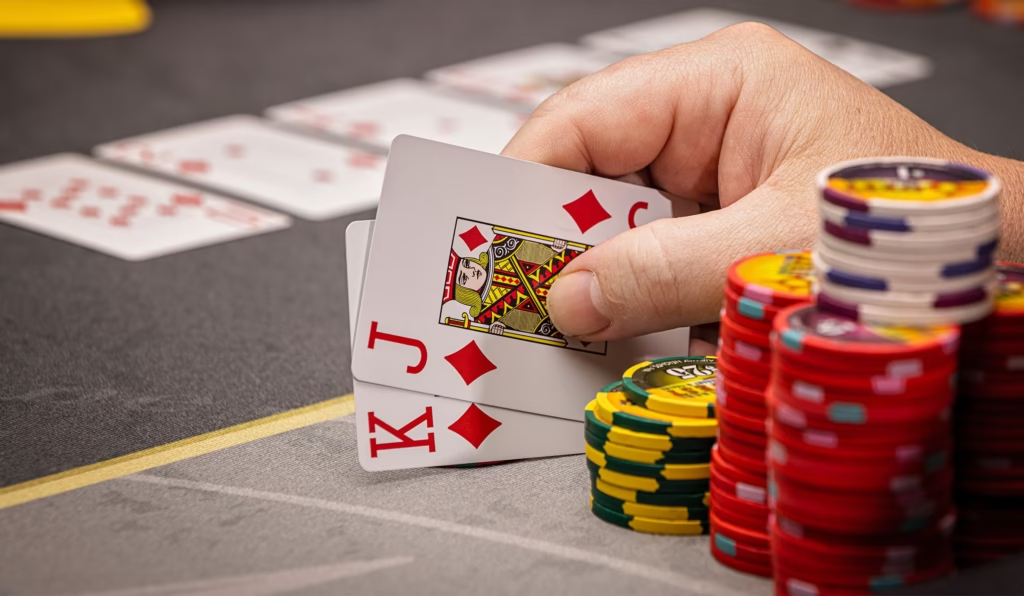The Psychology of Poker: Understanding Tells and Mind Games
Poker is often described as a game of skill and strategy, but its psychological aspect is just as crucial. While cards and chips are the tangible elements of the game, the mind is the true battleground where victory or defeat is often decided. Understanding tells and leveraging mind games can give you a significant edge, whether you’re sitting at a live table or competing online.
In this blog, we’ll explore the fascinating world of poker psychology, diving into how to spot tells, control your own behavior, and use psychological tactics to outwit your opponents.

1. What Are Tells?
Tells are subtle clues—intentional or unintentional—that reveal information about a player’s hand or intentions. These can be physical actions, verbal cues, or betting patterns that give away what a player is thinking.
Common Physical Tells in Live Poker
- Eye Movement: Players who glance quickly at their chips after seeing their cards often indicate a strong hand.
- Shaky Hands: Nervousness, often seen when a player has a strong hand, can cause their hands to tremble.
- Fidgeting: Constant movements, like tapping fingers or playing with chips, can indicate anxiety or bluffing.
- Sudden Stillness: Some players freeze when they’re bluffing, trying not to draw attention to themselves.
Online Poker Tells
While you can’t see physical behaviors in online poker, there are other indicators to watch for:
- Bet Timing: Quick bets often signal confidence, while long pauses may indicate indecision or weakness.
- Bet Sizing: Unusual or inconsistent bet sizes can be a clue that a player is bluffing or inexperienced.
2. Controlling Your Own Tells
While spotting tells in others is essential, it’s equally important to control your own. If you’re not careful, you may inadvertently give away valuable information to observant opponents.
Tips for Minimizing Tells
- Practice a Neutral Demeanor: Maintain a consistent posture and expression regardless of the strength of your hand.
- Bet Consistently: Avoid sudden changes in bet size unless you’re deliberately trying to send a message.
- Control Your Timing: Take a similar amount of time to act on each decision to avoid revealing your thought process.
Over time, with practice, you’ll develop the ability to mask your emotions and intentions, making it harder for opponents to read you.
3. The Power of Reverse Tells
Advanced players can use reverse tells to deceive their opponents. This involves intentionally displaying behaviors or actions that suggest the opposite of your actual intentions. For example:
- Acting Nervous with a Strong Hand: Fidgeting or avoiding eye contact can mislead opponents into thinking you’re weak.
- Feigning Confidence with a Weak Hand: Acting overly confident might convince opponents you have a strong hand, prompting them to fold.
Reverse tells require practice and subtlety, but they can be a powerful psychological weapon when executed correctly.
4. The Role of Mind Games in Poker
Poker is as much a psychological battle as it is a game of cards. Mind games allow you to manipulate your opponents’ perceptions, decisions, and emotions, giving you an advantage at the table.
Common Mind Game Tactics
- Table Talk: Engaging in conversation can distract or unsettle opponents, making it harder for them to focus on their decisions.
- Bluffing: A well-timed bluff forces your opponent to question their own judgment, creating doubt and hesitation.
- Floating: Calling an opponent’s bet with a weak hand to put pressure on them in later betting rounds.
Mind games are not about disrespecting your opponents—they’re about leveraging psychology to gain a strategic edge.
5. The Importance of Emotional Control
In poker, emotional control is the cornerstone of successful play. Allowing emotions like frustration, anger, or excitement to influence your decisions can lead to costly mistakes.
How to Maintain Emotional Control
- Stay Objective: Focus on making the best decisions based on the information available rather than the outcome of previous hands.
- Take Breaks: If you’re feeling overwhelmed or frustrated, step away from the table to reset your mindset.
- Practice Patience: Avoid forcing plays out of boredom or impatience. Poker rewards calculated, deliberate action.
A calm and composed player is far less likely to be manipulated by others or fall victim to their own impulses.
6. Using Psychology to Exploit Opponents
Every player at the table brings a unique personality and playing style, and understanding these can give you a significant advantage.
Types of Players and How to Exploit Them
- Tight Players: These players are cautious and fold often. Bluffing them is usually effective.
- Loose Players: These players are more likely to call bets, so focus on playing strong hands and avoid bluffing too often.
- Aggressive Players: Use their aggression against them by trapping them with strong hands.
By observing and adapting to your opponents, you can tailor your strategy to exploit their weaknesses effectively.
7. Practice and Refinement
Mastering poker psychology takes time and effort. Regularly playing, reviewing your sessions, and studying advanced techniques will help you improve your ability to read opponents, control your own tells, and execute effective mind games.
Books, videos, and forums dedicated to poker psychology are excellent resources for expanding your knowledge and skills.
Conclusion
The psychology of poker adds depth and intrigue to the game, transforming it into a battle of wits and nerves. By understanding tells, controlling your emotions, and mastering mind games, you can gain a significant edge over your opponents.
Remember, poker is not just about the cards you’re dealt; it’s about how you play them—and how you play your opponents. With practice and a keen understanding of poker psychology, you’ll be well on your way to dominating the table.




